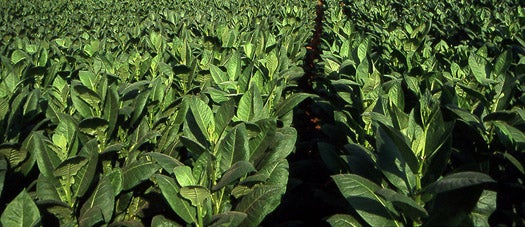Engineered Tobacco Plants Grow Synthetic Solar Cells
Where there's smoke, there's power

When it comes to energy efficiency, there’s still no substitute for millions upon millions of years of evolution. Scientists at UC Berkeley have found a way to hack common tobacco plants to grow synthetic photovoltaic and photochemical cells that can be extracted, dissolved in solution and sprayed onto a glass or plastic substrate to create solar panels. That’s the idea, anyhow.
Eons of living on earth have made plants very efficient gatherers of sunlight, so the researchers genetically programmed a virus that can infect a tobacco crop. But rather than replicating genetic copies of itself like a normal virus, this one causes the plant to manufacture artificial chromosphores, tiny structures that turn sunlight into high-powered electrons.
The chromosphores grow one atop another until they’re arranged in rods a few hundred nanometers long. Because nature is so good at harvesting solar energy, the chromosphores naturally arrange themselves just far enough apart to maintain a current, and just close enough that the electrons can be harvested.
The result is an environmentally safe manufacturing process for potentially limitless solar cells – as well as a healthy catalyst for tobacco farming. The cells are not quite as efficient as a silicon solar cell, but they are biodegradable and could be used in a variety of temporary or disposable capacities.
Of course, there’s a drawback: the UCB researchers haven’t actually demonstrated that the cells can turn light into usable electricity yet. While it’s easy to get caught up in green excitement, it will likely take years before consumer devices, much less power grids, are powered by these naturally grown synthetic solar cells.
But there is some interesting biology at play here. Hacking plants’ genomes to manufacture synthetic structures that can cleanly power our lives is a pretty revolutionary idea. The word “synthetic” often carries with it a connotation of being out of sync with the natural world; this kind of technology has the potential to change that.